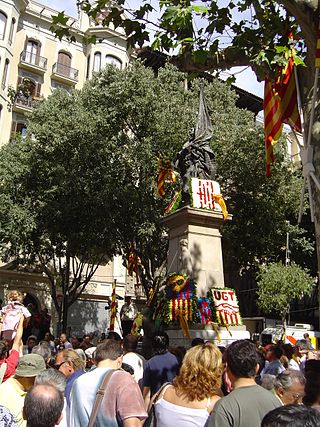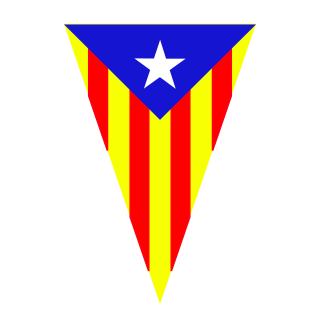| |||||
| Decades: | |||||
|---|---|---|---|---|---|
| See also: | |||||
Events from 1931 in Catalonia .
| |||||
| Decades: | |||||
|---|---|---|---|---|---|
| See also: | |||||
Events from 1931 in Catalonia .

Catalonia is an autonomous community of Spain, designated as a nationality by its Statute of Autonomy. Most of its territory is situated on the northeast of the Iberian Peninsula, to the south of the Pyrenees mountain range. Catalonia is administratively divided into four provinces or eight vegueries (regions), which are in turn divided into 42 comarques. The capital and largest city, Barcelona, is the second-most populous municipality in Spain and the fifth-most populous urban area in the European Union.

The recorded history of the lands of what today is known as Catalonia begins with the development of the Iberian peoples while several Greek colonies were established on the coast before the Roman conquest. It was the first area of Hispania conquered by the Romans. It then came under Visigothic rule after the collapse of the western part of the Roman Empire. In 718, the area was occupied by the Umayyad Caliphate and became a part of Muslim ruled al-Andalus. The Frankish Empire conquered northern half of the area from the Muslims, ending with the conquest of Barcelona in 801, as part of the creation of a larger buffer zone of Christian counties against Islamic rule historiographically known as the Marca Hispanica. In the 10th century the County of Barcelona became progressively independent from Frankish rule.

Francesc Macià i Llussà was a Catalan politician who served as the 122nd president of the Generalitat of Catalonia, and formerly an officer in the Spanish Army.

Lluís Companys i Jover was a Catalan politician who served as president of Catalonia from 1934 and during the Spanish Civil War.

"Els Segadors" is the official national anthem of Catalonia, nationality and autonomous community of Spain.
The Generalitat de Catalunya, or the Government of Catalonia, is the institutional system by which Catalonia is self-governed as an autonomous community of Spain. It is made up of the Parliament of Catalonia, the President of the Government of Catalonia, and the Executive Council of Catalonia. Its current powers are set out in the Statute of Autonomy of Catalonia of 2006.
The Republican Left of Catalonia is a pro-Catalan independence, social democratic political party in the Spanish autonomous community of Catalonia, with a presence also in Valencia, the Balearic Islands and the French department of Pyrénées-Orientales. It is also the main sponsor of the independence movement from France and Spain in the territories known as Catalan Countries, focusing in recent years on the creation of a Catalan Republic in Catalonia proper. Its current president is Oriol Junqueras and its secretary-general is Marta Rovira. The party is a member of the European Free Alliance.

Josep Tarradellas i Joan, 1st Marquess of Tarradellas was a Catalonian politician known for his role as the first president of the Government of Catalonia, after its re-establishment in 1977 under the new Spanish Constitution and the end of the Francoist Dictatorship. He was appointed the role of 125th President of Catalonia in 1954 but spent 23 years in exile until 1977 when he was officially recognised as the President of Catalonia by the Spanish Government.

The National Day of Catalonia, also known as the Diada, is a day-long festival in Catalonia and one of its official national symbols, celebrated annually on 11 September. It is one of the public holidays in Catalonia.

The Parliament of Catalonia is the unicameral legislature of the autonomous community of Catalonia. The Parliament is currently made up of 135 members, known as deputies, who are elected for four-year terms or after extraordinary dissolution, chosen by universal suffrage in lists of four constituencies, corresponding to the Catalan provinces. The Parliament building is located in Ciutadella Park, Barcelona.

The Palace of the Generalitat of Catalonia is a historic palace in Barcelona, Catalonia, Spain. It houses the offices of the Presidency of the Generalitat de Catalunya. It is one of the few buildings of medieval origin in Europe that still functions as a seat of government and houses the institution that originally built it.

Estat Català is a pro-independence nationalist historical political party of Catalonia (Spain).

The events of 6 October were a general strike, armed insurgency and declaration of a Catalan State by Catalonia's autonomous government on 6 October 1934, in reaction to the inclusion of conservatives in the republican regime of Spain. They took place as part of a nationwide strike and armed action known as the Revolution of 1934. Catalan President Lluís Companys declared the Catalan State at 8 p.m. Martial law was declared, and military forces attacked the Palau de la Generalitat de Catalunya and other buildings. Companys surrendered on the morning of 7 October.

Bonaventura Gassol i Rovira, known as Ventura Gassol, was a Catalan poet, playwright and politician. A nationalist, he was prominent member of the Esquerra Republicana de Catalunya.

The Statute of Autonomy of Catalonia of 1932, also called the Statute of Núria, was the first implemented statute of autonomy for Catalonia, officially providing self-government to Catalonia for the first time in more than 200 years. The Statute was promoted by the then acting President of the Generalitat, Francesc Macià and approved in a referendum by 99% of Catalan voters. The draft Statute was completed on 20 June 1931 in Núria and finally approved in the Spanish Parliament on 9 September 1932. It was implemented until the occupation of Catalonia by the Nationalist Army during the last stages of the Spanish Civil War, in 1939.

The Catalan Republic was a state proclaimed in 1931 by Francesc Macià as the "Catalan Republic within the Iberian Federation", in the context of the proclamation of the Second Spanish Republic. It was proclaimed on 14 April 1931, and superseded three days later, on 17 April, by the Generalitat de Catalunya, the Catalan institution of self-government within the Spanish Republic.

The 1934 Catalan local elections were held on 14 January to elect the municipal councils in all the 1,029 municipalities of Catalonia. These elections were only held in Catalonia, as the 1932 Statute of Autonomy devolved the competences on local elections to the Generalitat de Catalunya. These were the first and only election to be organised by the Catalan Government, since this administration was suppressed by the Dictatorship of Francisco Franco in 1939, after winning the Spanish Civil War. The following free local elections were not held until 1979, during the transition to democracy.

When, in 1939, World War II erupted in Europe, Catalonia was part of Spain led by the caudillo Francisco Franco, who declared Spain neutral in the conflict. The country was devastated by the recently finished Spanish Civil War, which resulted in the defeat of the Second Spanish Republic and the creation of the Spanish State, and Catalonia, who was an autonomous region under the Republican government (1931-1939) lost the whole of its self-government when the Nationalist army occupied the area.
Events from 1934 in Catalonia.

The Autonomous Region of Catalonia was established after the grant of self-government to Catalonia during the Second Spanish Republic (1931–1939), becoming an autonomous region within the Spanish Republic. The Generalitat of Catalonia was the institution in which the autonomous government of Catalonia was organized, it was established in order to replace the Catalan Republic proclaimed during the events of the proclamation of the Spanish Republic.
{{cite web}}: CS1 maint: unfit URL (link)